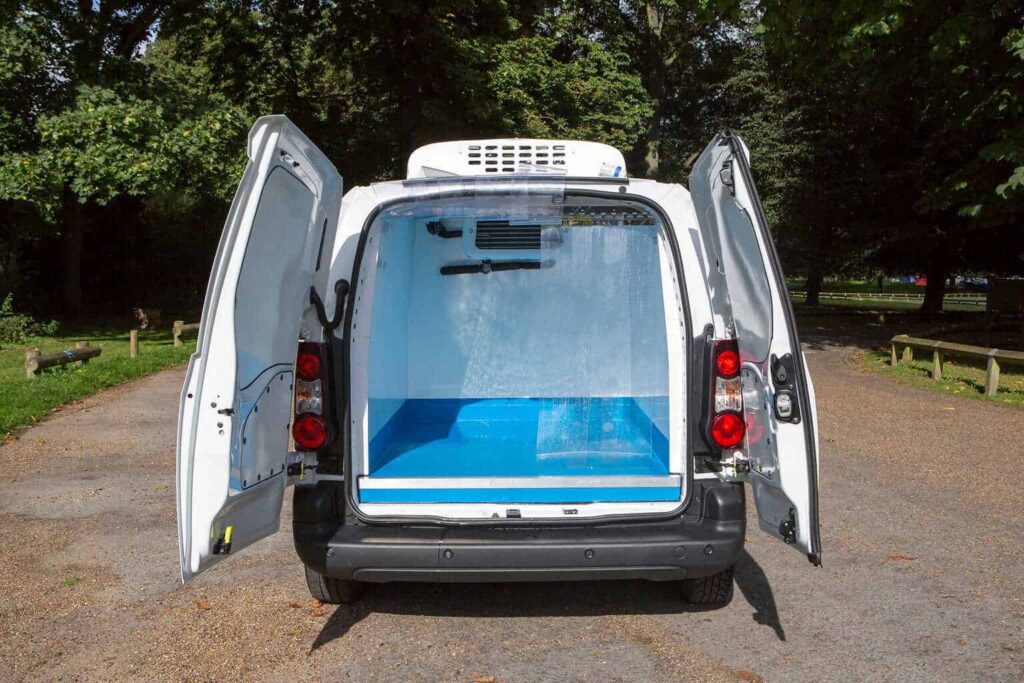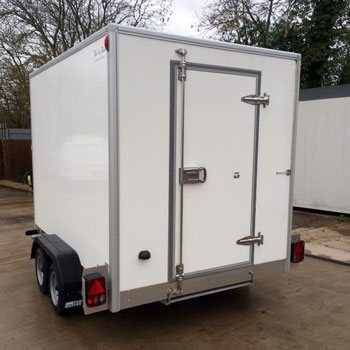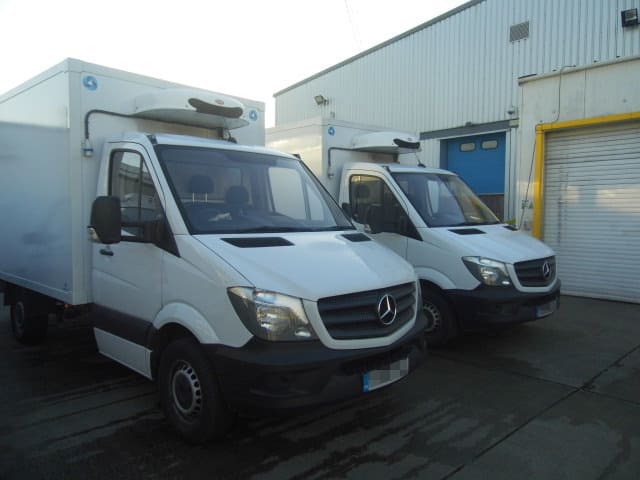At FridgeXpress, we’ve got several decades of experience providing state-of-the-art fridge vans for businesses all across the UK. Unlike many hire companies, we focus exclusively on fridge vans and nothing else, partnering with companies both large and small.
If you’re thinking of buying or hiring a small refrigerated van, here’s our quick guide on what to look out for and the elements you need to consider.
Who Needs a Small Fridge Van?
Small, refrigerated vans are commonly used by businesses that need to transport perishable goods, such as food and beverages. Examples include:
- Food delivery companies (for example, sandwich and local meal delivery): A small refrigerated van is useful to have if you transport food, especially in towns and cities where parking can be an issue.
- Grocery and convenience stores: Sole traders and medium size companies will often use a small fridge van for delivering to local stores of all shapes and sizes.
- Caterers and event planners: Whether you hire or buy, a fleet of small refrigerated vans are a cost-effective, viable solution for keeping food goods as well as drinks properly chilled for big events like weddings and festivals.
- Florists: Especially during the summer months, it’s important to keep flower deliveries at the right temperature so that bouquets arrive in pristine condition. Most florists use a chiller van nowadays.
- Medical supplies companies: Many drug companies, hospitals, healthcare providers and pharmacists use chiller, fridge and freezer vans to carry a range of different medical supplies.
You’ll also see a small reefer van used by seafood and meat distributors, beer and wine merchants, local farms that have stalls at markets, and even food banks and charitable organisations. Of course, if you carry any kind of perishables regularly, picking the right size vehicle is going to be critical.
How Big is a Small Refrigerated Van?
The first thing to consider if you are hiring or buying a new refrigerated van is whether it meets your requirements exactly. The first element to look at is the space you have. While an ordinary small van might seem big enough, you need to take into account the space that the mechanism and the insulation will take up. It is likely to significantly reduce the amount of storage that you have to play with.
If you have a constant payload that you need to carry and a small fridge van is just the right size, then it isn’t much of a problem. If you have a variable payload, for example, if you are subject to seasonal highs where you have more deliveries, a larger van may be a more cost-effective option.
Another thing you should consider is the temperature control mechanism. You may just want to keep the compartment cool which can mean all you need is insulation. If you require the temperature to be much colder, then the choice of mechanism is going to be important. You don’t want this to be too large so that it takes up a lot of room but you do need it to be reliable and effective.
The insulation for a small refrigerated van is likely to be between 50 and 100 mm thick, depending on how cold you want the compartment. Bare in mind that this is all the way around and can reduce the natural size quite considerably. In general, you should expect the compartment to be about 132cm long and 120 wide with a height of about 106 cm. of course, this can vary depending on make and model.
Hire or Buy: Which is Best?
If you are investing in a small reefer van for your business, there are a few options to consider. You rent your fridge van for a short period, have a longer contract hire or buy it outright.
Hire
Small refrigerated van hire is a good option if you need a vehicle to replace one that is off the road or you have a one-off delivery to make. It can also be a good choice if you are going through a busy period and simply want something to help take up the slack and add to your current fleet.
Contract Hire
If you require your refrigerated van for a longer period, or you want to develop your fleet, then opting for contract hire is the next best option. You don’t own the van outright but lease it from a provider for a set monthly fee. This has the added advantage that you get the maintenance and any repairs needed included in the contract.
Whether you require a chilled, freezer or multi-temperature van, at FridgeXpress we can tailor everything exactly to your needs. Find out more here.
Buy
The other option is to purchase the van of your choice and have it converted. This can be a lot more costly than contract hire. For example, you will need to finance the purchase either through a loan or savings and pay for the conversion on top of that. You will also have to cover the expense of repairs and maintenance.
This can be a good option if you only have one van but if you run a fleet it can quickly become unsustainable. In addition, the value of any vehicle, including a small fridge van is likely to depreciate over time so you may not be able to recoup its cost when you come to sell.
Can Any Van Be Converted into a Small Reefer Van?
We spend a lot of our time converting a range of different vans so they can carry refrigerated or frozen goods. One of the companies that we have built a strong relationship with over the last few years is the specialist food delivery outfit, La Chasse. For them, we had to work on a custom-manufactured vehicle that exactly fitted their needs. You can find out more here.
Typical models that are often converted to fridge vans include:
- Mercedes Citan: The van comes in diesel, petrol and electric varieties and is an all-round performer that is a great choice if you deliver in a big town or city. Able to take a payload up to 667kg its got a little more capacity than some other makes.
- Ford Transit Connect: This is another high-quality vehicle that can be converted easily into a chiller van. With a load space of 3.6 cubic metres it’s able to handle a 982 kg max payload easily.
How Do You Convert a Small Fridge Van?
Converting a normal van typically involves installing a refrigeration unit, insulation, and a power source (such as a battery or generator) to keep the interior of the van at a specific temperature.
The cost of the conversion can vary depending on the size of the van, the type of refrigeration unit used, and the complexity of the installation. On average, for a small, refrigerated van you would be looking at around £500 for a basic conversion with just insulation up to about £1500 for a more sophisticated system with temperature control.
It is highly recommended to consult with a professional refrigeration company like FridgeXpress to find the right installation and vehicle.
Electric vs Petrol Fridge Van
Many businesses are looking for ways to reduce their environmental footprint and save money on fuel costs at the same time. Despite rising electricity costs, EVs are still more economical to run but it’s important to consider the pros and cons before you decide one way or another.
Electric Fridge Vans
Pros:
- Low operating costs: Electric small fridge vans are cheaper to run in general which can mean significant savings over time.
- Zero emissions: Electric vans produce no emissions, making them an environmentally friendly option.
- Low maintenance: With fewer moving parts than petrol vans, you should expect less in the way of maintenance and repair costs.
Cons:
- High initial cost: Electric vans are currently more expensive to purchase than petrol vans. That can mean your initial outlay reduces the benefits of lower running costs.
- Limited charging infrastructure: While charging infrastructure is starting to improve in the UK, it is still a pretty slow process.
Petrol Fridge Vans
Pros:
- Low initial cost: Petrol vans tend to be cheaper to purchase than electric vans, though this may well change soon.
- Widely available fuelling infrastructure: Petrol stations are everywhere compared to electric charging stations.
- Travel range: Petrol vans travel much further on a single tank of fuel than electric vans can on a single charge.
Cons:
- High operating costs: Petrol vans are more expensive to operate than electric vans due to the cost of fuel. This may, however, be offset by the lower initial cost of buying the vehicle.
- Emissions: Despite improvements in recent years, petrol vans produce emissions which are harmful to the environment and air quality. In some areas like London and other big cities, you may have to pay extra to drive a petrol vehicle in certain areas.
- High maintenance costs: Petrol vans have more moving parts than electric vans, which means more maintenance and repair costs especially as they get older.
The decision to go for an electric vehicle or a petrol one ultimately comes down to your specific needs and budget. It can be worth talking to the team at FridgeXpress if you want to find out more about the benefits and which best suits your business.
Why Partner with FridgeXpress
FridgeXpress is one of the few companies in the UK that is focused entirely on refrigerated vans. We work with many businesses across all sectors to provide a flexible service that meets their needs exactly. Our customers vary from small food delivery companies to larger pharmaceutical corporations.
If you need a small fridge van, our expert team will tailor its provision to meet your exact requirements. Our support staff know more about refrigerated vans and how they are used in different sectors than any other team in the UK. You might want a small refrigerated van hire for just a few days or weeks or you may need a vehicle for a longer-term contract hire. You might even want to buy your van outright.
Whatever your requirements, our team is here to help and support your business. If you’d like to find out more, contact our expert support staff today.




